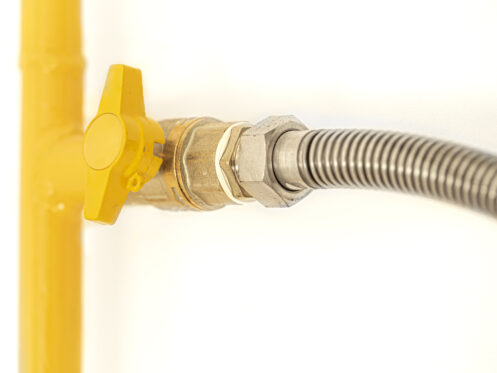Having one of your home’s natural gas lines start to leak is extremely dangerous. The biggest risk is that a spark or flame could cause the gas to ignite and start a fire or lead to a catastrophic explosion if the concentration of gas in any enclosed space in the house gets too high. Breathing in natural gas can also lead to nausea, dizziness, headaches, and other similar issues. In serious cases where the concentration of natural gas is high enough that it displaces most of the air, people and animals can even be at risk of death by asphyxiation.
The best way to ensure that your gas lines are in good condition and prevent all of these potential issues is by having them pressure tested. Here is everything that you need to know about how pressure testing works so that you can ensure that your gas lines are safe.
How Pressure Testing Gas Lines Ensures Your Safety
The purpose of pressure testing is to ensure that a gas line doesn’t have any leaks. Expansion and contraction caused by changes in temperature can sometimes lead to issues that cause the joints and fittings on a gas line to become loose. They could lead to the line leaking.
Gas lines can also corrode, and that could lead to a hole developing and the line leaking. As a gas line ages, it can also just start to deteriorate because of the constant pressure from the gas pressing against the insides of the pipe. By pressure testing a gas line, a plumber can easily determine if any leaks are present so that you can then get the line repaired or replaced before major issues arise.
An Overview of the Pressure Testing Process
All of the gas supply lines in a home have to be pressure tested one by one so that a plumber can accurately detect if any line is leaking and pinpoint the exact location of the leak. The process starts by isolating an individual supply line from the rest of the home’s natural gas supply. To do this, the plumber first needs to bleed the gas from the line and ensure there are no air pockets. To isolate a section of gas line, it’s necessary to disconnect it and then seal each end with a testing cap. The next step is to use a compressor and fill the line with air or another gas until the pressure reaches a certain PSI.
The plumber then uses a pressure gauge to check if the pressure in the line remains constant. If they can’t get the pressure high enough or the pressure quickly drops once the compressor is shut off, it’s an obvious indication that there is a leak somewhere in the line.
In most cases, the plumber is required to leave the gas line pressurized for at least 30 minutes and then check the pressure again since this allows them to determine if there is even a tiny leak. Some places instead require a 24-hour pressure test. If the line fails the pressure test, the plumber will then need to determine the location of the leak so that it can be repaired.
The easiest way to do this is to again pressurize the line and perform a bubble test by applying a special non-corrosive solution to every part of the pipe. To locate the leak, all they need to do is watch for any bubbles forming in the solution since this indicates that there is air leaking out of the pipe at that spot.
When pressure testing a gas line, it’s important to always test it at a higher PSI than the line’s normal operating pressure because it allows a plumber to identify any weak spots in the pipe or any joints and fittings. Even if the line isn’t currently leaking, any weak spots could lead to it leaking in the future.
By testing the line at a higher pressure, a plumber can determine if there is a risk of a future leak so that you can get the issue repaired or have the line replaced before a leak occurs. After the line has been repaired or replaced, it must then be pressure tested again to ensure the issue was fixed or the new line was installed correctly.
When Do You Need to Have Gas Lines Pressure Tested?
Building codes require that all new gas lines be pressure tested by a licensed plumber or pipe fitter before they can be put into service. You’re also required to have your gas lines pressure tested when making any other alterations to your home’s gas service. When replacing any gas appliance like a furnace or water heater, most experts also recommend having the gas line that supplies that appliance pressure tested before connecting the line to the appliance.
Many places require you to have your home’s gas supply fully disconnected and the meter removed when performing major renovations. In this case, you will generally also be required to have all of the gas lines in your house pressure tested before your gas supplier will reconnect your service and reinstall the meter.
If all of the gas lines in your home are old and you’re concerned about their condition and the potential of leaks, you can have your entire gas service pressure tested. However, the only way you can legally do this is again to have your gas service disconnected and your meter removed. In this case, you will have to pay a fee to your utility company for both the disconnect and the reconnect. This type of job is also relatively complex since the plumbers will need to disconnect and cap off each of the lines in your house so that they can all be tested individually.
Other than in the case of renovating a house when you’re required to pressure test your entire gas supply system, you’ll rarely need to pressure test all of your gas lines unless they are extremely old and in poor condition. If you suspect there is a gas leak somewhere in your house, a plumber can just use an electronic gas leak detector to check throughout your home for the presence of gas. If the detector goes off, the plumber can then find the leak by moving throughout the area to see where the reading is highest. Once they’ve determined the correct area and which gas line or appliance is leaking, they can again perform a bubble test to pinpoint exactly where the leak is.
Hope Plumbing is a locally owned company offering expert residential plumbing and gas line services throughout the Indianapolis area. If you need to have a new gas line installed, an existing line repaired, or want to have your gas lines pressure tested, you can count on us for help. We’re also ready to assist should you need any other plumbing, drain, or sewer repair, maintenance, or replacement services. To schedule an appointment and learn what makes us the most trusted plumbing service in Indianapolis, contact our team today.

